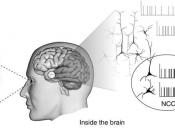What does Hegel mean by 'recognition' (Annerkenung)? What role does this notion play in the master/slave dialectic?
In this essay I will begin by putting the dialectic into context. I will then discuss the various interpretations on the dialectic in order to try to understand what Hegel was trying to say. It is in the development of the understanding of the dialectic that meaning and significance of recognition becomes clear.
This problem is essentially a problem developed out of the ideas of Fichte - in his search for freedom and rights - and is representative of Hegel's general philosophy. Hegel uses the dialectic as a step towards freedom as the ultimate goal. The problem is how we can become self-certain of our own self-consciousness.
To Hegel there are three stages contained in accepting the notion of self-consciousness:
(a)"the pure undifferentiated 'I'
(b)the reflection of self consciousness in the satisfaction of desire
(c)the duplication of self consciousness as a double reflection in the recognition of the self conscious by others
In order to even consider the problem, the first step must be accepted.
In order to begin considering the notion of self-consciousness, or even consciousness, the existence of the 'I' must be recognised. The second step, the reflection of self-consciousness, does not in and of itself solve the problem as I will show. The third step is the master/ slave dialectic. This represents a stronger desire, the desire for recognition and through this self-certainty of self-consciousness. I will discuss each of these steps in more detail.
Part (a) can be taken as given. Falling back on Descartes "Cogito ergo sum ". Hegel describes this as accepting the 'I' as an object itself. It seems fairly obvious that this step has to be the first stage in this discussion, and...


